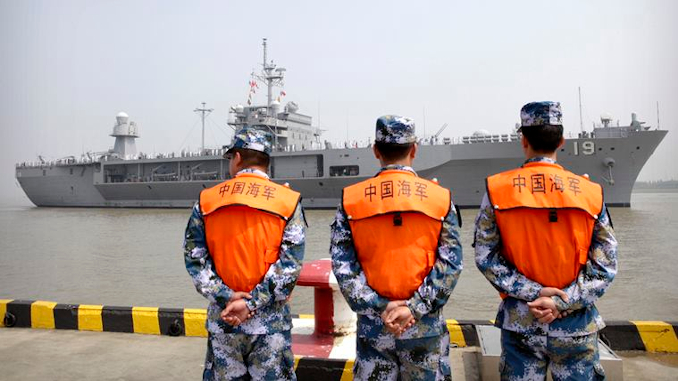
By Philip Giraldi
Why do I get the feeling that the White House and Congress appear to be setting the stage for the elevation of China to the status of foreign enemy number one? Indeed, if one has been hanging around Washington for the past 25 years or so, it was hard to miss the often-surfaced bipartisan contention that China is America’s major over-the-horizon adversary, or even enemy, with its growing economy, its successful geopolitics, and its large, industrious population. I can still recall my shock at hearing Democratic Senator Jim Webb, an honorable Iraq war critic, telling a conservative gathering in 2015 that the real threat to the United States would be coming from China.
Part 1 of Audio
Part 2 of Audio
Fear of China has a long tradition in the United States and Europe. The so-called “Yellow Peril” is a largely racially-derived metaphor that was developed in the late nineteenth century, when European and American imperialism and colonialism were at their peak. The United States, for example, sharply restricted the entry of would-be immigrant Chinese laborers through the Chinese Exclusion Act in 1882, the only time the U.S. has ever banned entry of potential residents based on their nationality.
Generally speaking, the so-called “Yellow Peril” demonized the peoples of East Asia and some of Southeast Asia as an existential threat to Western culture and civilization. As a cultural menace from Asia, fear of the “Yellow Peril” is mostly racial and not necessarily national, a fear frequently derived not from concern with a specific source of danger or from any one people or country, but from a vaguely ominous, existential fear of the faceless, nameless hordes of yellow people.
Nevertheless, historical developments like the Boxer Rebellion, the Russo-Japanese war, and the lead-up to WWII in the Pacific have in the past intensified negative views regarding some Asian nations, in particular China and Japan. In the current context, the U.S. government is certainly apprehensive about where the increasing rapprochement between China and Russia is going, summed up by Secretary of State Antony Blinken as “the deepening strategic partnership between the People’s Republic of China and the Russian Federation and their mutually reinforcing attempts to undercut the rules-based international order [that] run counter to our values and interests.” Ironically enough, that development stems from the inept U.S. diplomacy exemplified by Blinken that allowed a negotiable crisis to develop into a full-fledged war over Ukraine.
But a much more significant development stems from the Chinese success when playing at what might be called the global geostrategy game. The Chinese Silk Road project threatens to create a new economic reality for Eurasia, squeezing the U.S. out and creating unique networks for marketing, transportation, and the contractual exploitation of Third World natural resources. Again ironically, the U.S. was once upon a time the master at creating such networks to benefit the American economy, but unmanageable debt plus inflation combined with outsourcing and lack of any industrial policy means that advantage has largely vanished. To put it bluntly, China has outcompeted the United States, and whether that constitutes a threat depends on which side of the fence one is standing on.
And NATO appears fully on board to follow the lead provided by Blinken. NATO Secretary General Jens Stoltenberg observed how, “China is substantially building up its military forces, including nuclear weapons, bullying its neighbors, threatening Taiwan … monitoring and controlling its own citizens through advanced technology, and spreading Russian lies and disinformation.” Stoltenberg and Blinken’s indictment of China was followed by a NATO-issued “strategic concept” document that declared for the first time that China poses a “systemic challenge” to the alliance.
And the national security services are also on board. The U.S. and British heads of the FBI and MI5 collaborated in a press conference in London to condemn China as the “biggest long-term threat to our economic and national security.” But, as ever, there is another side to the story. While the “threat” may be so in theory, no one in the UK or U.S. is willing to confront the systemic missteps by London and Washington that have brought about that deplorable result.
One would not expect China to be silent when confronted by the threats from the West and, indeed, Beijing has made clear that there would be “consequences.” Chinese Foreign Ministry spokesman Zhao Lijian responded a few days after the Madrid NATO summit where Blinken and Stoltenberg spoke, observing that the “so-called rules-based international order is actually a family rule made by a handful of countries to serve the U.S. self-interest,” adding that “[Washington] observes international rules only as it sees fit.” Zhao also accused Blinken of using NATO to “hype up competition with China and stoke group confrontation.” He also noted that NATO’s history has centered around “creating conflicts and waging wars … arbitrarily launching wars and killing innocent civilians, even to this day,” before concluding that, “Facts have proven that it isn’t China that poses a systemic challenge to NATO, and instead it is NATO that brings a looming systemic challenge to world peace and security.”
It would be charitable to describe the U.S.-China relationship as currently occupying a low point. The result has inevitably been creating an international crisis where there was none to start with.
There have been two more interesting developments in the U.S. versus China saga in the past few weeks. The first came via a video-link “summit” between U.S. President Joe Biden and Chinese President Xi Jinping. Biden’s declared mission was to address those issues that impeded a more manageable relationship between the two countries, or at least that is how it was described.
The issues discussed by Biden and Xi included not taking any steps that would challenge the status quo regarding Taiwan as well as Chinese territorial claims in the South China Sea, which the U.S. asserts to have inhibited “freedom of the seas” for foreign vessels transiting the area. China has responded that it is only exercising its sovereignty and stresses that its international presence is largely derived from its perfectly legal commercial and business activity. Other issues under discussion included what to do about climate change and the evolving situation in Ukraine. The possibility of rolling back some tariffs imposed by former President Trump apparently was not discussed.
More provocative by far than the Biden phone call, which at least was ostensibly intended to mend fences, is that Speaker of the House of Representatives Nancy Pelosi made a provocative August trip to Taiwan, which might have been inclusive of an escort of U.S. fighter aircraft. It was the first visit by an American official at that level since 1997 and it sought to confirm America’s “total commitment” to the Taiwanese if China seeks to establish full control of the island.
The visit was linked to comments by Secretary of Defense Lloyd Austin that he would be reluctantly prepared to shift around military resources in the Far East to both enable and protect Pelosi’s travels on a U.S. Air Force plane if the Chinese were to attempt to block her by declaring a no-fly zone over the island. Austin in fact ordered the commander of U.S. forces in the Indo-Pacific region to send the Ronald Reagan Carrier Strike Group into the South China Sea as a “show of force.” This could have been construed as a deliberate demonstration to the Chinese that they have no actual sovereignty over Taiwan.
The ill-advised Pelosi visit itself was clearly a move intended to send certain signals to Beijing and those signals are not only not friendly but even threatening. It also is primarily intended to appeal to the domestic audience in the U.S. with midterm elections coming up in November. It is always popular to take cheap shots at Russia, Iran, or China. China, however, has already warned that there will be “consequences” for the planned Pelosi visit.
Interestingly, President Biden, supported privately by Austin, has actually opposed the Speaker’s trip as it could disrupt his intention to meet Xi face-to-face at some point in the future. Now that Pelosi, who lacks any formal foreign policy role, has made the trip, the Chinese leadership has confirmed their suspicions that the United States cannot be trusted to honor any agreement made by American leaders. The speaker clearly had not heard about nor understands the “One China Policy” and the “strategic ambiguity” that governs the relationship between China and the U.S. over Taiwan to avoid any military escalation regarding that issue.
Biden also muddied the waters by declaring three times that the U.S. might have to use force to defend Taiwan if it is attacked as Ukraine was, even though he and aides later insisted that he was not changing policy. The U.S., for its part, concedes the island is part of China though Beijing has not yet sought to assert political control over it. Given the thinly veiled threatening moves by Austin, one should imagine what the American reaction would be if China were openly making plans to fly its fighter jets into U.S. airspace in order to forcibly land a senior Chinese official without an invitation from the State Department.
As always, there are other possible developments, including reports that the U.S.-funded National Endowment for Democracy (NED) is active in currently unstable Myanmar (Burma), fomenting trouble to distract China in its own backyard. NED is notorious for its role in regime change operations that were once the responsibility of the CIA, including the 2014 Maidan revolt in Ukraine. China is surely aware of American involvement in regional meddling. Pushing from the other direction, North Korea is threatening to use nuclear weapons if it is attacked by the U.S. and South Korea, which will inevitably involve China.
On balance, the United States has little to gain and much to lose by ratcheting up the pressure on China and its leadership. Nancy Pelosi should stay home, and the White House should be working hard to identify and pursue those opportunities for cooperation between the two countries.
Framing China as an enemy of both the United States and of NATO is not the way to go, as it will literally force the Chinese to respond in kind. If one considers what is going on with Russia in terms of disruption of international trade, just imagine what would happen if the world’s biggest economy in China were to begin its own round of sanctions and selective withholding of manufactured goods. And then there is the risk of igniting yet another needless war, one that also comes with nuclear weapons as a last resort if either side were to perceive that it was “losing.”
It is just not worth it, is it? But then again, it never is.
Philip Giraldi is a former CIA counter-terrorism specialist and military intelligence officer and a columnist and television commentator. He is also the executive director of the Council for the National Interest. Other articles by Giraldi can be found on the website of the Unz Review.






